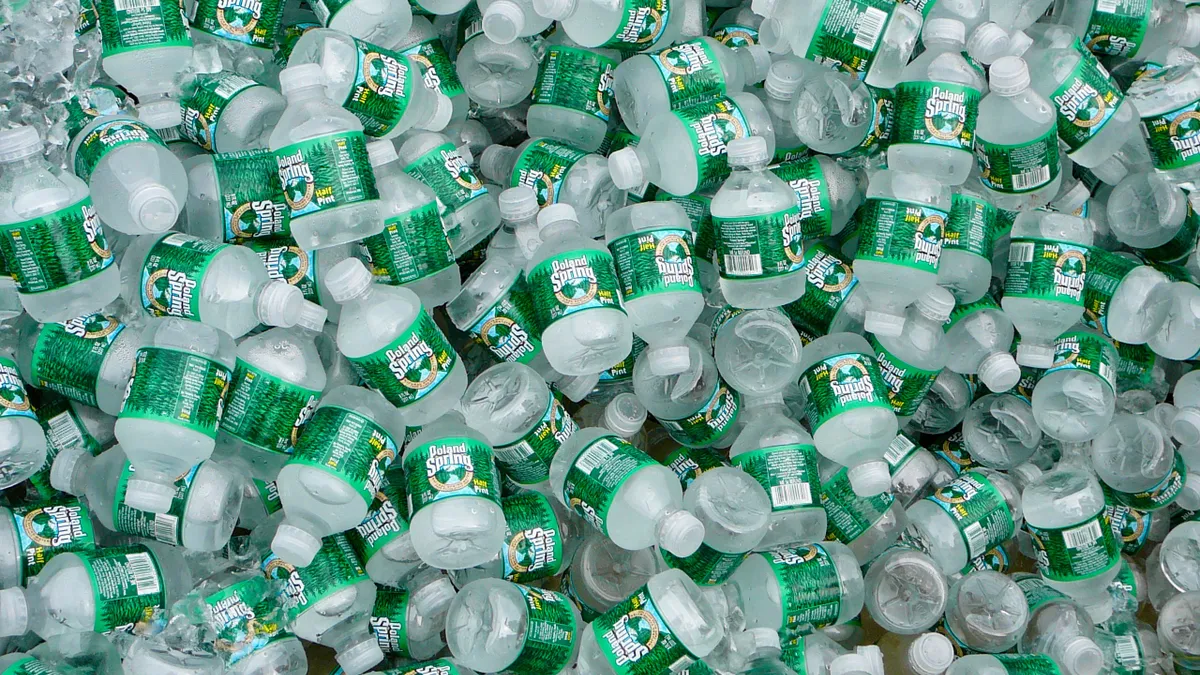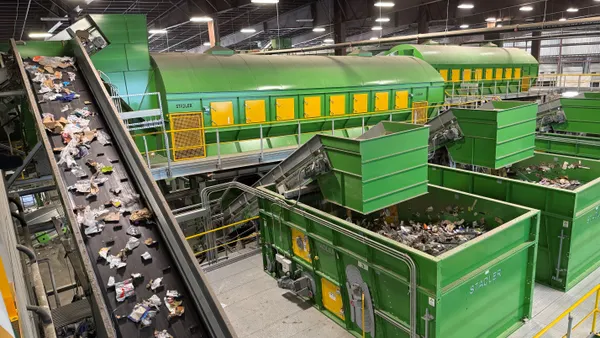Dive Brief:
- Nestlé Waters North America (NWNA) is supporting an amendment to a bill in Maine (LD 102) that would set minimum post-consumer recycled (PCR) content requirements for plastic beverage containers sold in the state. The amendment NWNA is backing calls for altering targets to begin at 25% by April 2025 and increase to 30% by April 2030.
- The original bill called for these containers to have 15% PCR by 2022, increasing to 25% by 2024. Other notable changes include an exemption for small manufacturers and the removal of language setting requirements for plastic caps.
- Recycling equipment company Tomra has endorsed the new language, along with the Natural Resources Council of Maine (NRCM), Conservation Law Foundation and other environmental groups. "Recycled content legislation supports plastic recycling markets because it creates more demand than would otherwise be created because of the relative low-cost of virgin plastic," said NCRM's Sustainable Maine Director Sarah Nichols in a statement to Waste Dive.
Dive Insight:
Like a number of other major beverage manufacturers, NWNA is working to meet lofty recycled content goals, and is in need of much more material to make that happen. In 2018, NWNA set targets pledging to hit 25% recycled content in plastic packaging by 2021, with a goal of 50% by 2025. Nestlé itself is additionally aiming to zero out emissions by mid-century across the company's operations and supply chain.
NWNA was previously recognized for designing a bottle with 100% PCR, in a sign that it is technically possible, and has committed to using 100% PCR for all containers in its Maine-based Poland Spring line by 2022. Yet the company's approach to PCR legislation has evolved over the years, making support for this new amendment a notable development.
In a Jan. 17 letter to Maine's Committee on Environment and Natural Resources, NWNA General Counsel Charles Broll wrote the company supports the goals of LD 102 but has concerns about the bill's approach. He said the proposed amendment submitted last week addressed those hesitations after work between NWNA and other stakeholders.
"Like other beverage manufacturers, we have made commitments to increase the use of recycled content throughout our portfolio," Broll wrote, going on to argue that "to achieve this, there needs to be a robust and stable regional supply of food-grade recycled content."
In addition to changing implementation dates, the new language also fleshes out a section on penalties by proposing manufacturers with 75% or more compliance (but less than 100%) be subject to between $0.05 cents and $.015 cents per pound of non-PCR plastic in the prior calendar year. That amount would rise progressively with lesser degrees of compliance.
It remains to be seen whether other major companies may also seek to back PCR legislation, but NWNA's alignment with key state environmental groups is notable. NRCM is a main backer of major extended producer responsibility legislation also being discussed in Maine this year. If LD 102 passed, it would be a ambitious bill for any state government.
April Crow, vice president for investor relations and external affairs at Circulate Capital, told Waste Dive that while major voluntary PCR commitments from large companies used to be "very segmented," they are now becoming more frequent.
"That's what we're seeing globally... all of the different companies making these commitments and looking to see how to advance that," said Crow, whose investment management firm works to advance circular economy ideas and prevent marine plastic debris. While she caveated there is "recognition that there's not a single solution" to circular economy efforts, Crow said it is becoming more common to see some companies engage with policy in an effort to meet their goals.
Policy aiming to tackle PCR isn't guaranteed success, however. Gov. Gavin Newsom vetoed California's AB 792 last fall, citing concerns over accountability for plastics manufacturers.
NWNA's latest push on the Maine bill came shortly after Nestlé announced that it intends to invest 2 billion Swiss francs ($2.1 billion) on shifting packaging away from virgin plastics. Despite the company's goals, environmental groups have repeatedly criticized Nestlé. In an audit published last October, the group Break Free From Plastics found Nestlé to be the world's second biggest source of plastics pollution globally for the second year in a row.













